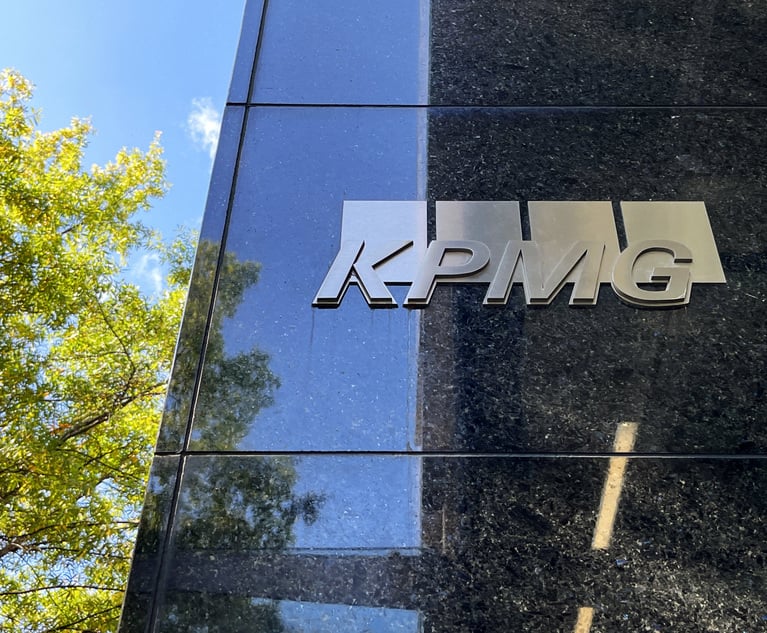Disrupting the Legal Sector Through Technology
Five questions with Mihui Pak, Vice President of Product for LegalMation.
January 03, 2019 at 01:39 PM
7 minute read
I recently had the chance to speak with Mihui Pak, Vice President of Product for LegalMation (https://www.legalmation.com/), about lessening pain points for both attorneys and legal clients through technology.
Erin Hichman: Can you tell me a little about yourself?
Mihui Pak: I am Vice President of Product for LegalMation. Before that, I was a litigator at O'Melveny & Myers LLP and also practiced at Morgan, Lewis & Bockius LLP. I started my career as a summer associate at Munger, Tolles & Olson LLP, and also clerked for two federal judges: the Honorable Rya W. Zobel in the District of Massachusetts and the Honorable Martin L.C. Feldman in the Eastern District of Louisiana. As an adjunct professor at Boston College Law School, I developed and taught an advanced legal writing seminar. I received my J.D. from Columbia Law School and graduated magna cum laude from Harvard University.
EH: Legal technology is suddenly exploding – what took so long?
MP: There are several possible theories for the delay. The slow shift to adopt new technology could represent a reluctance to embrace a broader cultural shift within the legal industry. The market is becoming less lawyer-centric and labor-intensive and more inter-disciplinary and tech-enabled. Lawyers are no longer the sole providers of legal expertise. Two separate commodities are emerging: 1) the practice of law, and 2) the business of delivering legal services. The practice of law includes training, licensing, ethical responsibilities, and client obligations, while the business of delivering legal services focuses on competition and innovation. In fact, this shift toward separation has been well underway in England and Wales. There, the Legal Services Act, 2007, which allows for new businesses called “alternative business structures” whereby non-lawyers can own and run legal businesses, came into full effect five years ago. While it has been observed that this liberalization has not changed the industry much in these last years, the larger role of technology will probably speed up that process. Hand in hand with that idea is that the technology itself has developed to a point that it is now useful to attorneys. More specifically, AI's natural language processing capabilities have advanced significantly in recent years and since this is a profession based on words, the technology is now capable of providing effective solutions for the industry.
Alternatively or additionally, another theory is that attorneys are constantly concerned about malpractice which results in the desire to stick to the tried and true methods. It is much easier to do something the way that it has always been done rather than use a new product that appears to be inconsistent with prior workflow with the added potential risk of having to explain to a client, or even worse, a judge that the technology didn't work as expected. Also, the hourly billing structure of the legal industry deters lawyers from using new technology in at least two ways. First, the main selling point of legal technology is saving the lawyer time, however, the billable model does not incentivize a lawyer to be more efficient with their time. Second, the focus on hourly billing does not encourage attorneys to spend time investigating and learning to use new technology. In plain terms, time spent locating and learning how to use a new piece of technology is not billable time. Another theory is simply that lawyers are creatures of habit and are not motivated to do things differently.
The true answer probably encompasses some combination of the above. The good news is that regardless of the reason, legal technology is exploding now and we have the technology to provide the highest quality products.
EH: The LegalMation founders have always made a point to invest and utilize technology as practicing attorneys. Did you ever experience push-back from clients or others in the legal industry because of your use of technology?
MP: The short answer is no. The use of technology cuts down on attorney work time, which results in lower costs for clients—a benefit that clients appreciate. However, clients are understandably unwilling to lower their standards when it comes to the quality of representation they receive. So, while the use of technology enhances the practice of law by increasing efficiencies, it is important to note that an attorney still reviews all work product and ensures that the client receives high-quality service. The client is the one who ultimately benefits so there is no reason for any push-back.
EH: What do you see as the top areas where technology can improve the legal industry?
MP: There are many pain points in the practice of law that can be improved or even eliminated by the use of technology. For example, we offer a product that allows attorneys to upload a complaint to our system which then produces a draft answer and initial written discovery specifically tailored to the allegations in the complaint in mere minutes. We have another product that allows attorneys to upload written discovery they've been served with into our system and receive draft responses to that discovery, including objections—again, in just minutes. Both of these products offer significant benefits to litigators because while these tasks are time-consuming, tedious, and repetitive, they are not mindless.
Case in point, one of our clients received 80 sets of written discovery questions for a single case, totaling 2,400 separate questions. It would probably take an attorney or paralegal several weeks to draft initial responses to those requests. That is a lot of questions to get through and each response must include the correct objections, otherwise, there can be negative repercussions for the responding party down the line. Our system was able to produce responses in a format ready to be served in just eight minutes. Eight minutes! Now an attorney would still need to review the responses before service but, that said, reviewing is a far cry from drafting. We plan on addressing pain points such as these at every stage of litigation.
EH: How does LegalMation help advance the legal industry?
MP: A common complaint of clients, is that they do not want to pay high hourly rates for a junior associate to carry out routine, repetitive tasks. They are, however, willing to pay significantly for the judgement, strategy, and creativity of experienced attorneys. By building products that take care of the routine, repetitive tasks, we are freeing up attorneys' time and energy and allowing them to focus on higher value work that clients want to pay for and that lawyers actually want to do.
Turning our focus onto the attorneys, we plan on continuing to develop products that address the pain points encountered at every stage of litigation. We have a deep understanding of those issues because almost half of our company is comprised of trained legal professionals with decades of litigation experience between them. As a legal tech company, we recognize that it is essential to focus on the areas of litigation that attorneys or the end users want to improve, which is why we have a legal team that continually tests our products for quality and ease of use.
In addressing the concerns of clients and attorneys, we anticipate wider positive effects in the legal industry as a whole. For example, cost is a big barrier to entering the legal arena. By creating products that lower litigation costs, more people may be able to hire the legal representation they need, attorneys may be able to take on more pro bono cases, and it may even the playing field between smaller firms and larger firms. Even more exciting is that fact that we have only just begun to tap into the potential of this technology. From our vantage point, the possibilities are virtually limitless.
This content has been archived. It is available through our partners, LexisNexis® and Bloomberg Law.
To view this content, please continue to their sites.
Not a Lexis Subscriber?
Subscribe Now
Not a Bloomberg Law Subscriber?
Subscribe Now
NOT FOR REPRINT
© 2025 ALM Global, LLC, All Rights Reserved. Request academic re-use from www.copyright.com. All other uses, submit a request to [email protected]. For more information visit Asset & Logo Licensing.
You Might Like
View All
The Week in Data Jan. 21: A Look at Legal Industry Trends by the Numbers

Avoiding the Great Gen AI Wrecking Ball: Ignore AI’s Transformative Power at Your Own Risk
6 minute read
The Law Firm Disrupted: Tech Investment Is Necessary Yet Expensive. The Big Four Have a Leg Up

Trending Stories
Who Got The Work
J. Brugh Lower of Gibbons has entered an appearance for industrial equipment supplier Devco Corporation in a pending trademark infringement lawsuit. The suit, accusing the defendant of selling knock-off Graco products, was filed Dec. 18 in New Jersey District Court by Rivkin Radler on behalf of Graco Inc. and Graco Minnesota. The case, assigned to U.S. District Judge Zahid N. Quraishi, is 3:24-cv-11294, Graco Inc. et al v. Devco Corporation.
Who Got The Work
Rebecca Maller-Stein and Kent A. Yalowitz of Arnold & Porter Kaye Scholer have entered their appearances for Hanaco Venture Capital and its executives, Lior Prosor and David Frankel, in a pending securities lawsuit. The action, filed on Dec. 24 in New York Southern District Court by Zell, Aron & Co. on behalf of Goldeneye Advisors, accuses the defendants of negligently and fraudulently managing the plaintiff's $1 million investment. The case, assigned to U.S. District Judge Vernon S. Broderick, is 1:24-cv-09918, Goldeneye Advisors, LLC v. Hanaco Venture Capital, Ltd. et al.
Who Got The Work
Attorneys from A&O Shearman has stepped in as defense counsel for Toronto-Dominion Bank and other defendants in a pending securities class action. The suit, filed Dec. 11 in New York Southern District Court by Bleichmar Fonti & Auld, accuses the defendants of concealing the bank's 'pervasive' deficiencies in regards to its compliance with the Bank Secrecy Act and the quality of its anti-money laundering controls. The case, assigned to U.S. District Judge Arun Subramanian, is 1:24-cv-09445, Gonzalez v. The Toronto-Dominion Bank et al.
Who Got The Work
Crown Castle International, a Pennsylvania company providing shared communications infrastructure, has turned to Luke D. Wolf of Gordon Rees Scully Mansukhani to fend off a pending breach-of-contract lawsuit. The court action, filed Nov. 25 in Michigan Eastern District Court by Hooper Hathaway PC on behalf of The Town Residences LLC, accuses Crown Castle of failing to transfer approximately $30,000 in utility payments from T-Mobile in breach of a roof-top lease and assignment agreement. The case, assigned to U.S. District Judge Susan K. Declercq, is 2:24-cv-13131, The Town Residences LLC v. T-Mobile US, Inc. et al.
Who Got The Work
Wilfred P. Coronato and Daniel M. Schwartz of McCarter & English have stepped in as defense counsel to Electrolux Home Products Inc. in a pending product liability lawsuit. The court action, filed Nov. 26 in New York Eastern District Court by Poulos Lopiccolo PC and Nagel Rice LLP on behalf of David Stern, alleges that the defendant's refrigerators’ drawers and shelving repeatedly break and fall apart within months after purchase. The case, assigned to U.S. District Judge Joan M. Azrack, is 2:24-cv-08204, Stern v. Electrolux Home Products, Inc.
Featured Firms
Law Offices of Gary Martin Hays & Associates, P.C.
(470) 294-1674
Law Offices of Mark E. Salomone
(857) 444-6468
Smith & Hassler
(713) 739-1250








